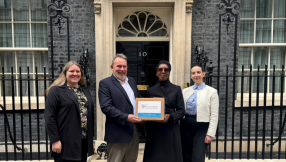
Campaigners opposed to assisted suicide are demonstrating outside the Welsh Senedd today as it debates a motion asking Westminster to make the practice legal in England and Wales.
The demonstration has been organised by Distant Voices, Christian Concern, the Christian Medical Fellowship, and the Society for the Protection of Unborn Children (SPUC).
They point to countries where assisted suicide is already legal to warn that promised safeguards will "quickly" be eroded.
In Canada, for example, assisted suicide was originally confined to terminally ill people whose death was "reasonably foreseeable". In 2021, the law was changed to include non-life threatening serious and chronic physical conditions. Today the country is in the process of expanding access to people with mental health conditions.
The same trend has been seen in other countries where assisted suicide is legal. The demonstration today will highlight the case of a 61-year-old man who was euthanised in the Netherlands with hearing loss as his only listed condition, and a 64-year-old Belgian woman euthanised for depression.
Other cases include Canadian Paralympian Christine Gauthier who said she was offered assisted suicide in response to a request for a stairlift.
Lead organiser of the demonstration, Nikki Kenward from Distant Voices, said that assisted suicide "is not the answer".
"The answer is to be cared for with absolutely brilliant, palliative care," she said.
Kenward suffers from Guillain-Barré Syndrome, which causes the body's immune system to attack part of the nervous system, leaving her locked in her own body and at one point she was able only to blink one eye.
She said that at times her life seemed unbearable and that it would have been easy to choose assisted suicide if it had been available. Now she feels grateful to have seen her son grow up and get married.
"If you'd asked me then, I would have said I'd rather not live. Just one of my eyes would open and I think if my family had been asked by the hospital they'd have opted to end my life. I hadn't seen my son for months and the thought of him being without me broke my heart more than what was happening to me," she said.
Campaigners warn that changing the law will result in some people believing they are better off dead.
Alithea Williams, of SPUC, said that the legalisation of assisted suicide "poses a grave threat to vulnerable people around the UK".
"Any such legislation will likely only be the start, as we have seen in Canada," she said.
"Once assisted suicide is permitted, the ethic of medicine, which is to care and not kill, will be changed forever.
"State-sanctioned death is even recommended in some quarters as a means to save health services money and free up hospital beds. This utilitarian view dehumanises patients and ultimately seeks to kill them.
"While this proposed law is framed as a matter of 'choice', evidence from counties where these methods of killing are lawful shows that patients often choose death because they don't want to be a burden or because they fear poor treatment – this is no choice at all."
Dr Mark Pickering, CEO of the Christian Medical Fellowship said, "Choice, compassion and dignity are deceptive and slippery campaign slogans ... The palliative care movement brings compassion and dignity to all at the end of life; it gives reasonable choice without false hope.
"The thing that's really cruel and broken about our current situation is that thousands of people who die each year without access to the excellent palliative care that can transform bad deaths into good ones."
Andrea Williams, chief executive of Christian Concern said the evidence shows that "the slippery slope is real".
"Once a country legalises assisted suicide, the 'safeguards' inevitably get widened and vulnerable [people] feel pressure to end their lives," she said.
"Helping people to end their lives is neither compassionate nor caring. The UK Parliament and the courts have rightly refused to change the law multiple times in the last few decades.
"MPs need to decide once again that human life deserves protection and care. We cannot be a society that believes some people are 'better off dead'."













